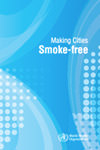2013
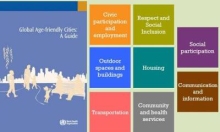
2nd WHO Consultation on Developing Age-friendly City Indicators, 8 September 2013, Québec City, Canada
The WHO Centre for Health Development (WKC) conducted the 2nd Consultation on Developing Age-friendly City Indicators on 8 September, 2013 in Québec City, Canada. This consultation is part of a series of consultations, started in 2012, organized by WKC in an effort to develop new technical guidance on monitoring the “age-friendliness” of cities. The objective of this consultation was to obtain expert opinion on how to advance the development of an age-friendly city monitoring framework and core indicator set. The consultation was held as a pre-conference meeting to the 2nd International Conference on Age Friendly Cities (9-11 September 2013, Quebec, Canada).
Fourteen international experts and seven WHO officers, representing five of the WHO regions, gathered for this one-day meeting. The main inputs for discussion were a draft monitoring framework and the preliminary results from a pilot study. Twenty cities from seven countries had so far participated in the pilot study which involved an evaluation of 61 indicators considered critical for monitoring age-friendliness of cities through previous consultation with officials and experts. The indicators were ranked by value scores assigned by local health officials and community representatives participating in the pilot study, and a short list of high-ranking indicators was constructed. During the meeting, the experts engaged in group work to provide specific feedback on the framework, the short-listed candidates for the core indicators and their proposed definitions.
The outcomes of the meeting suggest possible modifications to the structural and visual aspects of the framework, a narrower set of core indicators, and the development of an assessment tool that would help users apply the framework and core indicators to their own local context. Additional inputs will be sought before finalizing these products through further consultations with relevant experts as well as with local health officials and community representatives in Member States.
If you are interested in engaging in future consultations, please contact WHO Kobe Centre.

Key documents on Social Determinants of Health now available in Japanese
A group of Japanese experts on social determinants of health (SDH) has translated several key documents related to SDH into Japanese. These include the following WHO documents: 1) the executive summary of the Final Report of the WHO Commission on Social Determinants of Health; 2) the World Health Assembly resolution on reducing health inequities through action on the social determinants of health (WHA62.14); 3) the summary report of the World Conference on Social Determinants of Health (Rio de Janeiro, Brazil, 19-21 October, 2011); 4) the World Health Assembly resolution on the outcome of the World Conference on Social Determinants of Health, and 5) the Adelaide Statement on Health in All Policies, which resulted from a WHO-supported consultation. Selected chapters from the WHO report, “Equity, social determinants and public health programmes”, edited by E. Blas and A.S. Kurup, are also being translated.
These translations effectively remove the language barrier in accessing these essential documents for many Japanese policymakers and scholars. It is expected that these will serve as valuable resources as national efforts are made to achieve the renewed “Healthy Japan 21” targets, which include the reduction of health inequity through action on the social determinants of health. The translations were prepared by a Japanese research group led by Dr Toshiyuki Ojima (Hamamatsu University School of Medicine) and Dr Katsunori Kondo (Nihon Fukushi University) with funding from the Ministry of Health, Labour and Welfare, Japan. Several members of this group are regular contributors to the WHO Kobe Centre’s work on ageing and health metrics. Permission for the translations was granted by WHO and a technical review of the translation was performed by the WHO Kobe Centre.
- Executive summary of the Final Report of the WHO Commission on Social Determinants of Health
- World Health Assembly resolution on reducing health inequities through action on the social determinants of health (WHA62.14)
- Summary report of the World Conference on Social Determinants of Health (Rio de Janeiro, Brazil, 19-21 October, 2011)
- World Health Assembly resolution on the outcome of the World Conference on Social Determinants of Health (WHA65.8)
- Adelaide Statement on Health in All Policies
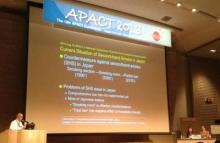
WKC at the 10th APACT Conference
The 10th Asia Pacific Conference on Tobacco or Health (APACT) was held in Chiba, Japan, 18-21 August 2013, under the title “Ending the tobacco epidemic – protecting and keeping healthy lives”. 785 delegates from 42 countries gathered to discuss current issues related to tobacco control and linkages with the non-communicable disease epidemic.
The WHO Kobe Centre (WKC), in coordination with WHO Headquarters and the WHO Regional Office for the Western Pacific (WPRO), organized a pre-conference workshop on Sunday, 18 August aimed at training city officials, civil society and health personnel in making cities smoke-free through the development of comprehensive local legislation, to protect the public against the harmful effects of second-hand smoke. This training is part of current efforts from WHO and its partners to tackle second-hand smoke exposure in cities.
22 delegates from Japan, Thailand, China, India, Indonesia, Korea, Singapore and Bangladesh attended the training, and will form a contingent of committed professional that may in turn train city officials and tobacco control stakeholders.
Training material available to the participants under the form of a workshop guide can be accessed below, as well as a facilitator workbook for those who aim to replicate such training in their city. An important resource is the WHO publication ‘Making your city smoke-free’ which provides lessons learned and guidance on developing legislation at the city level to protect the public against exposure to second-hand smoke. All these three documents are available to download in the links below.
Resources:
Booklet
Training material
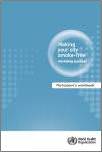 Making your city smoke-free workshop package:
Making your city smoke-free workshop package:
Participant's Workbook
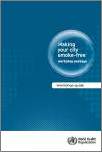 Making your city smoke-free workshop package:
Making your city smoke-free workshop package:
Workshop Guide
Posters:
WKC was also selected to present three posters highlighting results from the recent research conducted with Kobe Pharmaceutical University and University of Occupational and Environmental Health, Japan.
- Assessing the compliance of the ordinance banning smoking on selected streets in Kobe City, Hyogo, Japan
- Awareness of street smoking ban regulation in Kobe city: Results of interviews from a pedestrian survey
- The impact of designated smoking areas in where outdoor smoking is banned: The case of Kobe City
More information on the APACT can be found here.
For additional information, please contact WHO Kobe Centre.
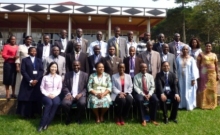
Intercountry Urban HEART Report Back Meeting in Africa
The WHO Regional Office for Africa and WHO Uganda, in collaboration with WHO Kobe Centre (WKC), organized the Urban HEART Intercountry Report Back Meeting in Entebbe, Uganda, 17-19 July 2013. WKC provided a global update on the status of Urban HEART implementation and offered further technical guidance to country and city officials on using Urban HEART in their respective contexts.
Representatives from eight African countries attended the meeting (Algeria, Burundi, Congo-Brazzaville, Ethiopia, Gabon, Kenya, Mali, Uganda) and presented their progress in addressing urban health. Congo-Brazzaville, Kenya and Uganda are currently implementing Urban HEART, while the other countries have initiated the process for Urban HEART.
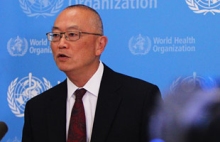
Emergency Committee advises on MERS-CoV
An Emergency Committee convened by WHO’s Director-General under the International Health Regulations (IHR) to assess the Middle East Respiratory Syndrome – coronavirus (MERS-CoV) situation today unanimously decided that conditions for a public health emergency of international concern have not yet been met. Director-General Dr. Margaret Chan agreed with the Committee’s advice that the situation is of great concern, although it does not constitute a public health emergency at this time.

IAGG/WHO Special Symposium on Age Friendly Cities – Metrics and Evaluation Issues
The WHO Kobe Centre organized the “IAGG/WHO Special Symposium on Age Friendly Cities – Metrics and Evaluation Issues” at the 20th IAGG World Congress of Gerontology and Geriatrics on 26 June, 2013, in Seoul, Korea. The Symposium received sponsorship from the Seoul Metropolitan Government, which recently joined the WHO Global Network of Age Friendly Cities and Communities.
The World Congress of Gerontology and Geriatrics is a major vehicle through which IAGG achieves its objectives. Held every four years, internationally recognized experts in gerontology and geriatrics share their knowledge and experience through plenary presentations, invited symposia, paper and poster sessions. The 20th World Congress of Gerontology was held in Seoul, Korea from June 23rd to 27th, 2013.
The IAGG/WHO Special Symposium featured WHO Kobe Centre’s presentation of its achievements so far in developing indicators for monitoring the age-friendliness of cities, globally. The Symposium was chaired by John Beard, Director, WHO Dept of Ageing and Life Course. Other presentations highlighted age-friendly city initiatives and evaluation efforts among the Global Alliance for Healthy Cities in the Western Pacific Region and Japanese municipalities participating in the Japan Gerontological Evaluation Study (JAGES), as well as in the Age Friendly Cities of Ottawa, Canada and Seoul, Korea. Active discussions with the audience generated valuable inputs which will contribute to the further development of indicators for age-friendly cities.
Official Programme of the 20th IAGG World Congress:
IAGG/WHO Special Symposium on Age Friendly Cities– Metrics and Evaluation Issues
Programme:
Presentations:
- Developing Global Indicators for Age Friendly Cities
Dr Megumi Kano, WHO Kobe Centre - Healthy Cities for Active Ageing in the WHO Western Pacific Region
Dr Katrin Engelhardt, WHO/WPRO - Status and Future Plan of Age-friendly City Seoul: Its Evaluation and Development Plan
Dr Sang-Chul Lee, Seoul Welfare Foundation, Seoul, Korea - JAGES HEART 2012: Achievements and challenges
Dr Katsunori Kondo, Nihon Fukushi University, Nagoya, Japan - Testing the WHO Global Age Friendly City Indicators in Ottawa, Canada
Dr Louise Plouffe, International Longevity Centre, Rio de Janeiro, Brazil - Developing Indicators for Age Friendly Cities
Mr Amit Prasad, WHO Kobe Centre
Related links
International Association of Gerontology and Geriatrics (IAGG)
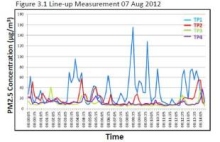
New WKC Publication: “Designated Smoking Areas in Streets Where Outdoor Smoking is Banned”
A new publication prepared by the WHO Kobe Centre, “Designated Smoking Areas in Streets Where Outdoor Smoking is Banned”, was published by the Kobe Journal of Medical Sciences.
Although Japan has been a signatory to the Framework Convention on Tobacco Control since 2004, progress in translating the recommendations into national policy has been limited. Globally, outdoor smoking bans cover outdoor dining areas, beaches, public parks, schools, etc. In Japan, most of existing outdoor smoking bans allow designated smoking areas (DSAs) in the no-smoking zones, thus limiting protection from second-hand smoke (SHS). The study examined the impact of DSAs on air quality in the areas of Kobe City where such ordinance is in force. Air quality measurements were conducted near two DSAs in August 2012 by using personal aerosol monitors.

WKC Publication: “Inequalities in noncommunicable disease mortality in the ten largest Japanese cities”
A new publication prepared by the WHO Kobe Centre, “Inequalities in noncommunicable disease mortality in the ten largest Japanese cities”, has just been published by the Journal of Urban Health.
The burden of noncommunicable diseases and social inequalities in health among urban populations is becoming a common problem around the world. This phenomenon is further compounded by population ageing. Japan faces the task of maintaining its high level of population health while dealing with these challenges. This study focused on the ten largest cities in Japan and, using publicly available administrative data, analyzed standardized mortality ratios to examine inequalities in relative mortality levels due to major noncommunicable diseases at both city and subcity levels.
- Kano, M, Hotta, M, Prasad, A. Inequalities in noncommunicable disease mortality in the ten largest Japanese cities. Journal of Urban Health, 2013, DOI: 10.1007/s11524-013-9808-9.
- This article is now available as 'Online First' on SpringerLink:
- The final publication will be available at Springer Link:
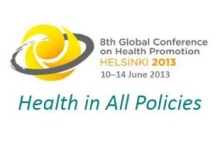
8th Global Conference on Health Promotion (8GCHP)
The 8th Global Conference on Health Promotion (8GCHP) was held in Helsinki, Finland, from 10 to 14 June 2013. The Conference has convened every few years since it was first organized in Ottawa, Canada in 1986, and it is the key event to advance the health promotion field, and presents an important opportunity for the WHO Kobe Centre (WKC) to share its work in urban health and intersectoral action for health.
WKC supported the conference through organizing 3 parallel sessions. All sessions were 1.5 hours, including two presentations, and time for questions and discussion with the audience.
Impact Assessment as a tool for implementing HiAP
10 June 2013 (16:15-17:45)
This session addressed the potential utility of Impact Assessment as a tool for policy makers to implement HiAP. Building upon the outcomes of a recent expert consultation on the topic hosted by WHO, this session took a closer look at how the health community can contribute to strengthening the attention to impacts on health through a focus on the determinants of health across various sectors.
The session was chaired by Dr Reiner Fehr, Professor, Department of Public Health, University of Bielefeld, Germany.
Presentations
- Use of impact assessments in achieving HiAP
Dr Rajiv Bhatia, San Francisco, United States - Institutionalized health impact assessment: How to make most use of it?
Dr Decharut Sukkumnoed, Kasesart University, Thailand
Health Promotion and Urban Planning
11 June 2013 (11:00-12:30)
Urban planning is a powerful tool for policy-makers to improve the health of urban populations and ensure health equity in cities. The session aimed to promote intersectoral policies and activities for health promotion and urban planning sectors and to share experiences and practical tools on healthy urban planning.
This session was chaired by Dr Keiko Nakamura, Professor, International Health, Division of Public Health, Graduate School of Tokyo Medical and Dental University, Japan.
Presentations
- Chair's introduction
- Process of urbanisation and health dynamics
Professor Gérard Salem, Université Paris Ouest Nanterre La Défense/ IRD, France - Healthy urban planning in Seoul
Dr Sohyun Park, Seoul National University, Republic of Korea
Local government as a key player in implementation of HiAP
11 June 2013, (11:00-12:30)
Local governments can play a pivotal role in improving health and health equity as they often have direct influence on a wide range of urban health determinants, and are also advantaged in terms of proximity to citizens and potential participation. This session examined how HiAP is implemented, and discusses the challenges and opportunities for HiAP at the local government level. Examples of local governments that have successfully implemented HiAP were shared.
The session was chaired by Dr Ling Chew, Director, Research & Strategic Planning, Health Promotion Board, Singapore.
Presentations
- Local government as an arena for HiAP
Dr Asa Cristina Laurell, CAESS, Mexico - Intersectoral/HiAP approaches to recusing health risks in New York City and California
Dr Lynn Silver, Sonoma County, California, United States
Innovating financing for health promotion
12 June 2013 (17:00-18:30)
Presentation by Mr Alex Ross, Director, WKC:
In the past decade, WHO and its development partners have developed different strategies for global innovative financing for health for various health conditions, as well as strategies to spur intersectoral action for health. The presentation introduced lessons from past global initiatives as well as to rethink how global initiatives can be tailored nationally to support health promotion goals. These include the Global Fund to Fight AIDS, TB and Malaria; GAVI; the Solidarity Tobacco Contribution concept; the UNITAID airline tax levy; the IFFim; Debt-2-Health; Product Red; Financial Transaction Tax, and others. There are also several examples of national innovative financing strategies and mechanisms that can support health. These include the use of tobacco and alcohol taxes (for example in supporting national health promotion foundations), taxes on mobile phone use, remittances from persons living abroad, as well as various resources mobilized by local nongovernmental organizations and potentials for appropriate partnering with private sector.
8GCHP: Health in All Policies (HiAP)
Date: 10-14 June 2013
Venue: Finlandia Hall, Helsinki, Finland
Co-hosts:
World Health Organization (WHO)
Ministry of Social Affairs and Health, Finland
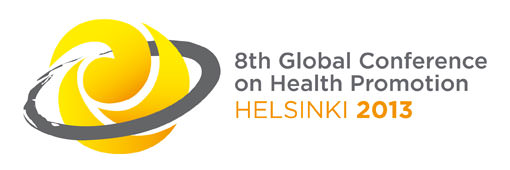
The 8th Global Conference on Health Promotion (8GCHP) was held in Helsinki, Finland, from 10 to 14 June 2013. The Conference has convened every few years since it was first organized in Ottawa, Canada in 1986, and it is the key event to advance the health promotion field, and presents an important opportunity for the WHO Kobe Centre (WKC) to share its work in urban health and intersectoral action for health.
The Conference was co-organized by the World Health Organization (WHO) and the Ministry of Social Affairs and Health of Finland (MSAH). Around 800 participants attended the Conference including heads of state and cabinet ranking officials. The theme of the Conference was “Health in All Policies” (HiAP), with a focus on its practical implementation.
The WHO Kobe Centre was a core part of organizing the Conference. WKC officials presented on innovative financing for health promotion, and organized three sessions to discuss impact assessment to promote intersectoral action for health, local government and HiAP, and health promotion and urban planning.

Conference aimed
- To facilitate exchange of experiences and lessons learnt and give guidance on effective mechanisms for promoting intersectoral action
- To review approaches to address barriers and build capacity for implementing Health in All Policies (HiAP)
- To identify opportunities to implement the recommendations of the Commission on Social Determinants of Health through HiAP
- To establish and review economic, developmental and social case for investing in HiAP
- To address the contribution of health promotion in the renewal and reform of primary health care
- To review progress, impact and achievements of health promotion since the Ottawa Conference
Who attended
Participation was by invitation only. Neary 900 participants attended the conference, representing different levels of Member State governments, UN and international organizations, civil society and international financial institutions and foundations representing health and other relevant sectors.

World No Tobacco Day, 31 May 2013 – Ban tobacco advertising, promotion and sponsorship
Every year, on 31 May, WHO and partners everywhere mark World No Tobacco Day, highlighting the health risks associated with tobacco use and advocating for effective policies to reduce tobacco consumption. Tobacco use is the single most preventable cause of death globally and is currently responsible for killing one in 10 adults worldwide.
The theme for World No Tobacco Day 2013 is: ban tobacco advertising, promotion and sponsorship.
The Day presents an opportunity for government, industry, and civil society stakeholders to consider what they can do to prevent tobacco use, and what specifically they can do to ban advertising, promotion, and sponsorship of tobacco products.
A comprehensive ban of all tobacco advertising, promotion and sponsorship is required under the WHO Framework Convention for Tobacco Control (WHO FCTC) for all Parties to this treaty within five years of the entry into force of the Convention for that Party. Evidence shows that comprehensive advertising bans lead to reductions in the numbers of people starting and continuing smoking. Statistics show that banning tobacco advertising and sponsorship is one of the most cost-effective ways to reduce tobacco demand and thus a tobacco control “best buy”.
Goals
The global tobacco epidemic kills nearly six million people each year, of which more than 600 000 are non-smokers dying from breathing second-hand smoke. Unless we act, the epidemic will kill more than eight million people every year by 2030. More than 80% of these preventable deaths will be among people living in low- and middle-income countries.
The ultimate goal of World No Tobacco Day is to contribute to protect present and future generations not only from these devastating health consequences, but also against the social, environmental and economic scourges of tobacco use and exposure to tobacco smoke.
- spur countries to implement WHO FCTC Article 13 and its Guidelines to comprehensively ban tobacco advertising, promotion and sponsorship such that fewer people start and continue to use tobacco; and
- drive local, national and international efforts to counteract tobacco industry efforts to undermine tobacco control, specifically industry efforts to stall or stop comprehensive bans on tobacco advertising, promotion and sponsorship.

Please see the WHO websites for more information on tobacco.
Link to: WHO World No Tobacco Day 2013 website


